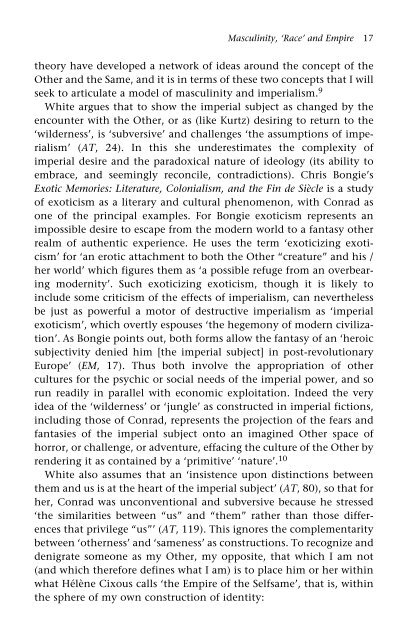Conrad and Masculinity
Conrad and Masculinity
Conrad and Masculinity
Create successful ePaper yourself
Turn your PDF publications into a flip-book with our unique Google optimized e-Paper software.
<strong>Masculinity</strong>, ‘Race’ <strong>and</strong> Empire 17<br />
theory have developed a network of ideas around the concept of the<br />
Other <strong>and</strong> the Same, <strong>and</strong> it is in terms of these two concepts that I will<br />
seek to articulate a model of masculinity <strong>and</strong> imperialism. 9<br />
White argues that to show the imperial subject as changed by the<br />
encounter with the Other, or as (like Kurtz) desiring to return to the<br />
‘wilderness’, is ‘subversive’ <strong>and</strong> challenges ‘the assumptions of imperialism’<br />
(AT, 24). In this she underestimates the complexity of<br />
imperial desire <strong>and</strong> the paradoxical nature of ideology (its ability to<br />
embrace, <strong>and</strong> seemingly reconcile, contradictions). Chris Bongie’s<br />
Exotic Memories: Literature, Colonialism, <strong>and</strong> the Fin de Siècle is a study<br />
of exoticism as a literary <strong>and</strong> cultural phenomenon, with <strong>Conrad</strong> as<br />
one of the principal examples. For Bongie exoticism represents an<br />
impossible desire to escape from the modern world to a fantasy other<br />
realm of authentic experience. He uses the term ‘exoticizing exoticism’<br />
for ‘an erotic attachment to both the Other “creature” <strong>and</strong> his /<br />
her world’ which figures them as ‘a possible refuge from an overbearing<br />
modernity’. Such exoticizing exoticism, though it is likely to<br />
include some criticism of the effects of imperialism, can nevertheless<br />
be just as powerful a motor of destructive imperialism as ‘imperial<br />
exoticism’, which overtly espouses ‘the hegemony of modern civilization’.<br />
As Bongie points out, both forms allow the fantasy of an ‘heroic<br />
subjectivity denied him [the imperial subject] in post-revolutionary<br />
Europe’ (EM, 17). Thus both involve the appropriation of other<br />
cultures for the psychic or social needs of the imperial power, <strong>and</strong> so<br />
run readily in parallel with economic exploitation. Indeed the very<br />
idea of the ‘wilderness’ or ‘jungle’ as constructed in imperial fictions,<br />
including those of <strong>Conrad</strong>, represents the projection of the fears <strong>and</strong><br />
fantasies of the imperial subject onto an imagined Other space of<br />
horror, or challenge, or adventure, effacing the culture of the Other by<br />
rendering it as contained by a ‘primitive’ ‘nature’. 10<br />
White also assumes that an ‘insistence upon distinctions between<br />
them <strong>and</strong> us is at the heart of the imperial subject’ (AT, 80), so that for<br />
her, <strong>Conrad</strong> was unconventional <strong>and</strong> subversive because he stressed<br />
‘the similarities between “us” <strong>and</strong> “them” rather than those differences<br />
that privilege “us”’ (AT, 119). This ignores the complementarity<br />
between ‘otherness’ <strong>and</strong> ‘sameness’ as constructions. To recognize <strong>and</strong><br />
denigrate someone as my Other, my opposite, that which I am not<br />
(<strong>and</strong> which therefore defines what I am) is to place him or her within<br />
what Hélène Cixous calls ‘the Empire of the Selfsame’, that is, within<br />
the sphere of my own construction of identity:




